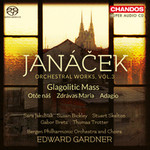|
Back
03/29/2016
Leos Janácek: Glagolitic Mass – Otce nás – Zdrávas Maria – Adagio
Sara Jakubiak (soprano), Susan Bickley (mezzo-soprano), Stuart Skelton (tenor), Gábor Bretz (bass), Thomas Trotter (organ), Bergen Philharmonic Choir, Choir of Collegium Musicum, Edvard Grieg Kor, Bergen Cathedral Choir, Bergen Philharmonic Orchestra, Edward Gardner (conductor)
Recording: Grieghallen; Bergen Cathedral (August 2015) – 64’30
Chandos CHSA5165 – Booklet in English and French

   
Edward Gardner follows up his first and second volumes of Janácek’s constantly engaging orchestral works with a blistering performance of the monumental Glagolitic Mass in crystalline sound. Gardner seems intent on becoming the Neeme Järvi of the twenty-first century, gradually making his way through the coloristic, engaging masterworks of the past century (Bartók, Szymanowski, Walton, Britten, and Lutosławski among them), casting them in the spotlight of Chandos’ “super audio” recordings. After hearing several of these discs, as well as Gardner conduct Rachmaninoff live, it is clear that there is talent and capability here. What hasn’t quite come to light is Gardner’s exact musical personality, and the present disc, despite its many positive qualities, does little to improve that impression.
First and foremost, the Bergen Philharmonic Orchestra, Gardner’s home band since October 2015, play even the most challenging of Janácek’s passagework with ease. Brass passages, especially in the Introduction and Intrada of the Mass, bring to mind the glory days of the Chicago Symphony Orchestra. In middle movements, the playing is likewise rhythmically precise with flawless blend and intonation. Woodwinds are impressive, but occasionally get lost despite clear manipulation in the mixing booth; cor anglais and soft clarinet passages are especially susceptible. String sound might not match the depth Vienna Philharmonic in its heyday, and the solo violin in the Svet (Sanctus) is a bit wobbly, but the playing is otherwise exemplary. The organ, masterfully played by Thomas Trotter in the Mass (who also features on Charles Dutoit’s Montreal recording) is well-blended when offering support, gloriously resonant when playing solo. This may be a result of separate recording venues for the organ part.
The massed choirs sing with an almost athletic gusto. At times, the tone is not “pretty,” but this seems in keeping with Janácek’s exploitation of extreme registers, dynamics, and unique rhythms. The soloists have large, powerful voices, and match the remainder of the performers in technical prowess. Tenor Stuart Skelton brings true heldentenor resonance to his stratospheric entries near the end of the Veruju (Credo), but only the Hungarian bass Gábor Bretz brings anything close to a Slavic edge to his voice. The result stands in stark contrast to native Czech/Slovakian voices, which make the many superlative recordings on Supraphon indispensable.
Gardner’s interpretation seems intent on highlighting contrast, at times at the expense of nuance; this is especially noticeable in the second have of the Svet, which is exciting at first, but suddenly seems rushed. The Intrada likewise is pushed a little too far, becoming a sonic texture rather than a panoply of differentiated lines.
The disc is filled out with earlier sacred works, with hints of Janácek’s unique rhythmic and harmonic voice occasionally shining through. Otce nás (Our Father) is the most substantial of these, with motivic economy in the harp and organ accompaniment underlying lush vocal lines. Zdrávas Maria (Ave Maria) allows Jakubiak to have the spotlight, sensitively supported by solo violin, organ, and choral responses; it is a brief, but highly attractive work. The disc also includes the very early orchestral Adagio, which shows influence of Tchaikovsky and even Berlioz with its imaginative scoring, especially for woodwinds.
The extensive liner notes by John Tyrell are useful for contextualizing the lesser-known works on the disc; full texts, biographies, and information on the Bergen Cathedral organ are all included, as well as wonderful archival photography of the composer. In all, this would be a solid recording of the Mass, but the main reason to purchase this disc—like the prior two releases in the series—might be to fill out a completist’s collection of Janácek’s music in the most modern digital sound available.
Marcus Karl Maroney
|